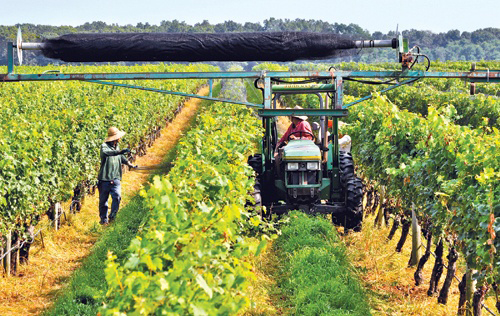Editorial: Big things from little grapes on the North Fork

It was a time when potato farms were fast disappearing from the North Fork. Given the expense of farming on Long Island, growers found it all but impossible to compete with potato farmers in the Midwest, Canada and elsewhere. The days when potato fields covered 60,000 acres in Nassau and Suffolk became a memory as farm after farm, from the bay to the Sound, fell to development. It seemed as if the North Fork would soon be no different from Holtsville or most any other place on the West End.
Enter the grape — first planted here commercially by Louisa and Alex Hargrave in 1972. Forty years ago, the couple could never have imagined how those tentative first steps would transform, and help preserve, the region’s centuries-old agriculture tradition.
Many deserve credit for decades of work fighting to maintain the region’s rural way of life; civic groups, environmental advocates and government officials come to mind. But make no mistake, the economy always has final say. As Long Island Farm Bureau director Joe Gergela often says, the best way to preserve farmland is to keep farming profitable. Sure, pumpkins and agritainment have helped, but nothing’s done more for the region and local agriculture than the industry that gave the North Fork its other moniker: Long Island Wine Country.
Row upon row of grapevines, tasting rooms and other supporting structures — not housing developments — have now replaced the rows of spuds and potato barns that long dominated the landscape. Better yet, the vineyard operations have made the region a destination for tourists from near and far. Wineries employ local adults and young people alike and host weddings and other events that supply business for local florists, hotel owners, caterers and restaurateurs, bed & breakfast operators and others. A burgeoning craft beer industry complements the wineries and, with that, some local farmers are taking to growing hops and even barley so beer can be made entirely from local ingredients.
There’s no better time to remember the industry’s contribution to the North Fork and Long Island than now, during the annual Winterfest Jazz on the Vine festival, which kicks off this weekend and runs until March 17. The event was founded to help support the wineries during the slower winter months. Its success has helped Long Island Wine Country evolve into a year-round destination, helping our economy even further.
So here’s to another 40 years of ingenuity and success for the region’s wine industry.



